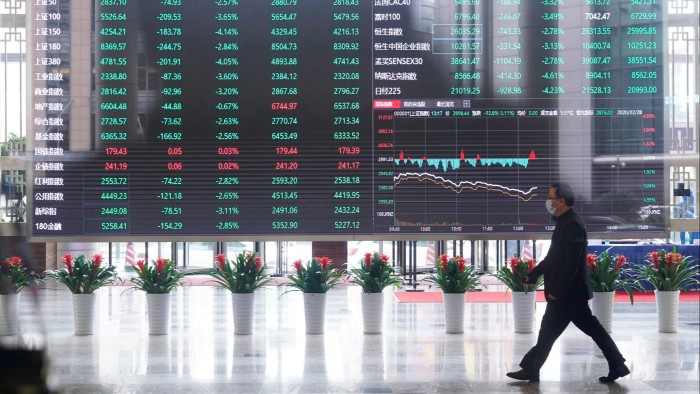China’s ETF price war heats up

Simply sign up to the Exchange traded funds myFT Digest -- delivered directly to your inbox.
Latest news on ETFs
Visit our ETF Hub to find out more and to explore our in-depth data and comparison tools
Chinese fund managers are slashing fees on large broad-based equities exchange traded funds as the regulator-led active fund fee reforms spread into the passive fund space.
Escalating demand for onshore equities ETFs has also prompted more asset managers to enact fee cuts as they strive to attract more investors and subscriptions amid dismal sales of active equities fund sales.
ICBC Credit Suisse Asset Management became the latest firm to announce on February 8 that it would reduce management and custodian fees for its ICBC Credit Suisse CSI 300 ETF with immediate effect, according to a filing with the China Securities Regulatory Commission.
The Sino-foreign joint venture’s broad-based ETF is the seventh in the market to see fee cuts since the markets regulator confirmed industry-wide fee reforms in July of last year.

This article was previously published by Ignites Asia, a title owned by the FT Group.
The fund now has an annual management fee of 0.15 per cent — the lowest rate among onshore ETFs — down by 30 basis points from the original 0.45 per cent. Its custodian fee has also been halved to 0.05 per cent.
None of the country’s existing ETFs charge fees that are above new rules stipulated last year by the CSRC for active equities funds, Wind data shows. The rules demand that domestic fund companies lower management fees on equities and equities-focused mixed-asset funds to a maximum of 1.2 per cent per year.
But as fund houses scramble to lure more investor money into the increasingly popular ETF market, some large asset managers have moved to further push down the already low fee levels for their passive fund offerings, according to analysts.
Lower fees have swept beyond the largest broad-based ETF in the industry as well.
Wind data shows that 125 ETFs now have an annual management fee of 0.15 per cent, accounting for about 13 per cent of a total of 934 onshore ETFs. Of these low-fee strategies, 38 are broad-market ETFs.
E Fund Management also became the first firm in the market to cut fees for onshore ETFs in September after the reforms, dialling down the yearly management fee for its SSE STAR 50 ETF from 0.5 per cent to 0.4 per cent.
That same month, HuaAn Fund Management and ICBC Credit Suisse AM also reduced management fees for their SSE STAR 50 ETFs to 0.15 per cent and 0.3 per cent respectively.
E Fund in the subsequent months lowered fees for three more ETFs, including the E Fund CSI 1000 ETF, E Fund CSI 2000 ETF and E Fund SSE STAR 100 ETF, while Invesco Great Wall Fund Management cut management fees for its ChiNext 50 ETF to 0.15 per cent from 0.5 per cent in January.
The ICBC Credit Suisse CSI 300 ETF had Rmb3.1bn ($435.6mn) in assets as of February 8, down by more than half from close to Rmb6.9bn when it was launched in May 2019, according to Wind data.
There are now 19 CSI 300 ETFs in the market managing a combined Rmb479bn in assets. Six charge an annual management fee of as low as 0.15 per cent.
E Fund, China’s largest fund house by overall assets, now runs the country’s largest CSI 300 ETF at over Rmb100bn. The fund, which is one of those charging 0.15 per cent, became just the third local ETF to reach the milestone last week.
*Ignites Asia is a news service published by FT Specialist for professionals working in the asset management industry. Trials and subscriptions are available at ignitesasia.com.
Comments